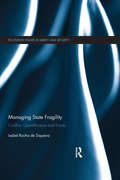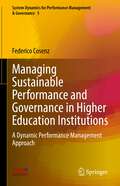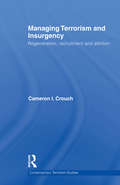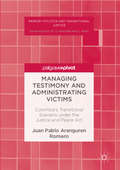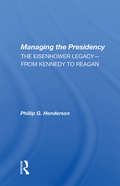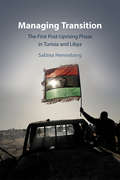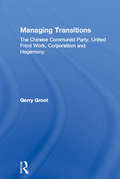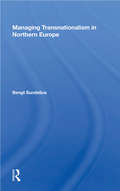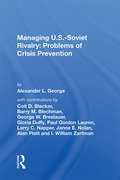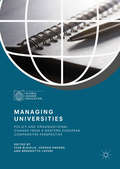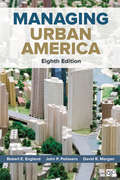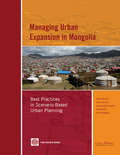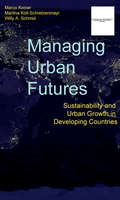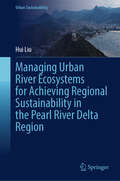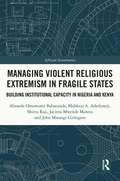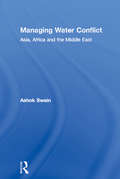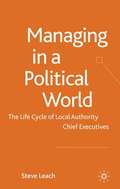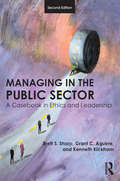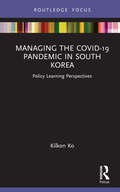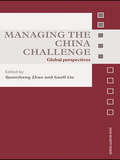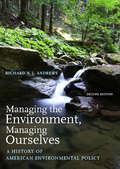- Table View
- List View
Managing State Fragility: Conflict, Quantification and Power (Routledge Studies in Liberty and Security)
by Isabel Rocha de SiqueiraThis book examines the management of ‘state fragility’ and the practices and impacts of quantification over relations of power in international politics. With the further movement towards quantification, and as technical and technological changes advance, this book argues that certain important quantifying practices can be understood in terms of symbolic power, which is more nuanced and subtle. The aim is that such an understanding can also open space for considering other instances of power that are blurred and nuanced in current international politics. By looking at how the merging of conflict and development issues in the fragile states agenda has been fed by and has fed the authority of ever-perfectible numbers, the book offers an approach to address the difficulty in dealing with profound inequality without presuming domination. Instead, the example of the g7+ group of self-labelled ‘fragile states’ and its tools indicate that quantification has reached a point of no return, but it has done so through indirect practices of management and with the complicity, so to say, of those deemed least favoured by it. This shows that there is little chance that policy-makers and academics can escape dealing with numbers and there is much to be gained by understanding how complex and knowingly imperfect statistics become authoritative and widespread. This book will be of much interest to students of critical security studies, International Political Sociology, development studies, and IR in general.
Managing Sustainable Performance and Governance in Higher Education Institutions: A Dynamic Performance Management Approach (System Dynamics for Performance Management & Governance #5)
by Federico CosenzThe fast-changing evolutionary process of global Higher Education systems systematically poses new challenges related to the appearance of innovative elements that lead academic governing bodies to question current managerial structures and methods. Due to this, theory and practice have gathered multiple contributions and experiences to support and further develop this evolutionary pathway during the past decades. Global competitiveness, economic and social growth are driven worldwide by knowledge and innovation. In this context, Higher Education Institutions play a crucial role as they primarily contribute to knowledge transfer and development and, as a result, foster regional development, employment, and economic wealth. The relevance of this role leads Universities to explore alternative solutions for managing their performance according to a sustainable perspective. This book draws on this flourishing debate on Higher Education policy and management and investigates an innovative systemic perspective to design and implement sustainable performance management systems for academic institutions. The conditions for the success of Universities, the critical issues underlying the creation of academic value, the dynamic complexity characterizing academic governance settings, the pluralistic audience of stakeholders and related expectations, the causal interplays between organizational performance variables, represent some of the central themes around which this work is developed. More specifically, the book suggests and discusses the adoption of a Dynamic Performance Management approach to frame the inherent organizational complexity of Higher Education Institutions, thus supporting a strategic learning perspective to design and implement relevant performance measures. This approach originates from the combination between conventional performance management and System Dynamics modeling. Many research and practice contributions prove that this methodological combination can boost the understanding and interpretation of value creation processes by identifying and exploring the causal connections amongst strategic resource allocation and consumption, corresponding performance drivers, emerging outputs, and outcomes. To test the effectiveness of this approach in University settings, a wide range of examples is offered in each book chapter. This allows readers to explore the advantages, limitations, and practical implications of adopting Dynamic Performance Management in Higher Education Institutions, as well as guide academic decision-makers towards a more robust approach to design and implement strategic management mechanisms in Universities.
Managing Terrorism and Insurgency: Regeneration, Recruitment and Attrition (Contemporary Terrorism Studies)
by Cameron I. CrouchThis book examines how governments can weaken the regenerative capabilities of terrorist and insurgent groups. The exploration of this question takes the form of a two-tier examination of three insurgent actors whose capacity to regenerate weakened in the past: the Front de libération du Québec (FLQ) of Canada, the Movimiento de Liberación Nacional - Tupamaros (MLN-T) of Uruguay and the Provisional Irish Republican Army (PIRA) of Northern Ireland during the mid-1970s. At the first level of its examination, the book investigates the extent to which the regenerative capacities of the FLQ, MLN-T, and PIRA weakened because of an increase in attrition and a decrease in recruitment. The primary objectives of this analysis are to uncover whether a declining intake of recruits played a lesser, equal, or greater role than a burgeoning loss of personnel in weakening the capacities to regenerate of the three insurgent actors; and, in turn, to shed greater light on the broader validity of the prevailing view in conflict studies that a decrease in recruitment is more important than an increase in attrition in effecting the corrosion of an insurgent actor's capacity to regenerate. At the second level of its exploration, the book assesses the effectiveness of five of the most prominent policy prescriptions in the literature and insurgent recruitment and attrition: ameliorating grievances, selective repression, discrediting insurgent ideology, improving intelligence collection, and restricting civil liberties This book will be of much interest to students of terrorism and counter-terrorism, conflict studies, strategic studies and security studies in general. Cameron Crouch is currently an Analyst at Allen Consulting Group, an Australian economics and public policy consulting firm. He has a PhD from the Strategic and Defence Studies Centre at The Australian National University.
Managing Testimony and Administrating Victims
by Juan Pablo Aranguren RomeroThis book analyzes the implementation of Law 975 in Colombia, known as the Justice and Peace Law, and proposes a critical view of the transitional scenario in Colombia from 2005 onwards. The author analyzes three aspects of the law: 1) The process of negotiation with paramilitary groups; 2) The constitution of the Group Memoria Histórica (Historic Memory) in Colombia and 3) The process of a 2007 law that was finally not passed. The book contains interviews with key actors in the justice and peace process in Colombia. The author analyses the contradictions, tensions, ambiguities and paradoxes that define the practices of such actors. This book highlights that a critical view of this kind of transitional scenario is indispensable to determine steps towards a just and peaceful society.
Managing The Presidency: The Eisenhower Legacy--from Kennedy To Reagan
by Phillip G. HendersonThis book offers an overview of the developing body of empirical research on the Eisenhower presidency. It provides an analysis of key features of Eisenhower's staffing structure, his institutional presidency, his decision making and relation between the White house and cabinet.
Managing Transition: The First Post-Uprising Phase in Tunisia and Libya
by Sabina HennebergExamining the factors that shaped the first interim governments of Tunisia and Libya, which formed in the immediate aftermath of the 2011 uprisings that brought down their governments, Managing Transition analyses each interim government to enhance our understanding of how political transition occurred within two North African countries. Tracing the importance of the key decisions made during these transition periods, Sabina Henneberg demonstrates the importance of these decisions taken during the short phase between authoritarian collapse and first post-uprising elections, including decisions around leadership, institutional reform, transitional justice, and the electoral processes themselves. By documenting, in close detail, the important events of the 2011 Arab Uprisings, and the months that followed, this study shows that while pre-existing structures strongly influence the design and behaviour of first interim governments, actors' choices are equally important in shaping both immediate and longer-term phases of transition.
Managing Transitions: The Chinese Communist Party, United Front Work, Corporatism and Hegemony
by Gerry GrootManaging Transitions examines the history and roles of China's minor parties and groups (MPG's) in the Chinese Communist Party's (CCP) united front between the 1930's and 1990's using Antonio Gramsci's principles for the winning and maintaining of hegemony. Gramsci advocated a "war of position," the building of political alliances to isolate existing state powers and win consent for revolutionary rule and transform society. Economic reform is now creating new socio-economic groups and the CCP is adjusting the united front and the MPGs to co-opt their representatives and deliberately forestall the evolution of an autonomous civil society and middle class which could challenge CCP rule. This has resulted in a new and expanding role for the united front, the MPGs and organisations representing the new interest groups.
Managing Transnationalism In Northern Europe
by Bengt SundeliusHow can political leaders best control the effects of transnational links on their societies, maintaining the prosperity brought by such ties while minimizing their unstabilizing effects? The answer, according to some observers, rests in collective management through joint policymaking processes. This work explores the strategy used in Scandinavian countries for collectively coping with transnationalism. Although focus ing on a unique case, it is highly relevant to broader international efforts at policy coordination and joint problem solving. The author first analyzes the extent of Nordic transnational ties and identifies the principles involved in collective management. He then outlines the means, scope, and frequency of regional contacts among political leaders and bureaucrats and analyzes the norms and dynamics of joint policymaking to determine what roles the various principals play in the collective management effort. Policy results are reviewed in order to evaluate the relative success of Nordic methods, and comparisons are made between issue areas and degrees of salience to reveal the types of issues most effectively treated by the Nordic strategy.
Managing U.s.-soviet Rivalry: Problems Of Crisis Prevention
by Alexander L. GeorgeThis book examines the lessons of the U.S.-Soviet experiment with detente in the 1970s, with particular attention to the effort to develop a basis for cooperating in crisis prevention. It provides a reconceptualization of the problem of moderating U.S.-Soviet rivalry.
Managing Universities
by Benedetto Lepori Ivar Bleiklie Jürgen EndersThis book asks how modern universities are organized and managed, and questions whether 30 years of university reforms have resulted in stronger managerial structures and leadership control. It further asks whether current organisational and decision-making structures can be explained by public reform policies. The book offers a coherent, empirically grounded and theoretically driven presentation of data and core ideas behind a large scale comparative study of 26 universities across eight European countries. It focuses on the strength of university managerial structures, the role of academics, and how universities relate to and depend on their environment: to governments and other actors; to funders; to evaluators; and to external stakeholders. It further explores how higher education policies are shaped by and affect universities. Written by a cross-disciplinary team of European scholars, this book is unique both in its wide coverage and the depth of its analyses. It will be of great interest to scholars, graduate students and advanced undergraduates in the fields of organisation theory and sociology, policy studies, comparative public policy and administration, and higher education studies. It will also be of interest to higher education policy makers and administrators.
Managing Urban America
by John P. Pelissero Robert E. England David R. MorganManaging Urban America guides students through the challenges, politics, and practice of urban management—including managing conflict through politics, adapting to demographic and social changes, balancing budgets, and delivering a myriad of goods and services to citizens in an efficient, equitable, and responsive manner. The Eighth Edition has been thoroughly updated to include a discussion of the difficulties cities confront as they deal with the lingering economic challenges of the 2008 recession, the concept of e-government and how it affects the theory and practice of management, and the implications of environmental issues for urban government management.
Managing Urban America
by John P. Pelissero Robert E. England David R. MorganManaging Urban America guides students through the challenges, politics, and practice of urban management—including managing conflict through politics, adapting to demographic and social changes, balancing budgets, and delivering a myriad of goods and services to citizens in an efficient, equitable, and responsive manner. The Eighth Edition has been thoroughly updated to include a discussion of the difficulties cities confront as they deal with the lingering economic challenges of the 2008 recession, the concept of e-government and how it affects the theory and practice of management, and the implications of environmental issues for urban government management.
Managing Urban Expansion in Mongolia: Best Practices in Scenario-based Urban Planning
by Tumentsogt Tsevegmid Yoonhee Kim Brett Sedgewick James ReichertThe sustainable development of "ger" areas in Ulaanbaatar, the capital of Mongolia, is one of the critical development issues facing Mongolia. The ger areas host 60% of the population of Ulaanbaatar, and they have expanded 35 times larger than the original center of the city. Provision of basic services (e.g. heating and water supply) is very limited or non-existent in ger areas. The lack of basic public services resulted in air and water pollution as well as serious health risks to residents. The government tries to control expansion of the city, particularly ger areas, but its policy practices have been inconsistent. These inconsistent actions are, in part, a result of limited awareness and understanding by the general public, as well as by the policy makers, of the public costs of their actions. There is high susceptibility to ad-hoc behaviors that place premiums on short-term private gains over long-term value-creation in public goods. Many supporting mechanisms, including land valuation and taxation, have not yet been developed to create incentives for long-term value creation. Mongolia: Enhancing Policies and Practices for Ger Area Development in Ulaanbaatar aims at helping policy makers and citizens of Ulaanbaatar to improve their understanding of the consequences of their choices of policies and practices. Specifically, it intends to provide clear cost and benefit implications of three different development paths (central, mid-tier, and fringe gers) for seven sectors (land and housing, water supply, roads and public transport, heating, electricity, solid waste, and social services). The report is a best practice in urban planning exercise which provides useful information that can apply for other big cities.
Managing Urban Futures: Sustainability and Urban Growth in Developing Countries
by Martina Koll-Schretzenmayr Marco Keiner Willy A. SchmidUrbanization is one of the most powerful forces influencing global sustainability. It is dominated by three factors: population growth, rural-urban migration and subsequent urban expansion. Perhaps nowhere are these factors more dominant than in developing countries. This volume brings together leading experts including Alan Gilbert, John Friedmann, Saskia Sassen and Janice Perlman to explore the conflicting challenges of rapid urbanization in developing countries. While all have to contend with key issues such as social segregation, poverty, and loss of governability, the ongoing forces of urban growth vary from country to country. By comparing the challenges of urbanization in Africa, Latin America, Asia and the Pacific, this book puts forward a new way of thinking about mega- and million-cities in developing countries - one that promotes their vital function in society as engines of ideas, technologies, societal change, democratic transformation and loci of political will to build a new regime of global sustainability.
Managing Urban River Ecosystems for Achieving Regional Sustainability in the Pearl River Delta Region (Urban Sustainability)
by Hui LiuThis book provides a systematic understanding of urban river management from the perspective of ecosystem health in the Pearl River Delta region of China, where rapid socio-economic development happens together with exploitation and pollution of the natural environment. Urban rivers, which used to support navigation and provide water resources to humans, now suffer from various kinds of ecosystem degradation and thus create threats to regional sustainability. This book treats the urban river as an ecosystem which closely relates to and interacts with humans and defines urban river ecosystem health as a requirement at three levels: sensorial fitness, living water, and affinity with humans, which emphasizes more on the human-oriented needs. The evolution processes of urban river ecosystem health protection can generally be divided into four phases, demonstrating the relationships between human activities and UREH status as simple balance, uncontrolled imbalance, continuous interlocking, and stable harmony. The relationships between typical urban rivers and humans in the Pearl River Delta region, China, are then analyzed on both regional and local scales and from lateral, time-longitudinal, and spatial dimensions. Intensive human activities, together with the intrinsic complex and high-density river network, result in deteriorating water quality, changing hydrological conditions, and damaging the river ecosystem in this region. From the perspective of political ecology, various actors in urban river management include governmental agencies, business, multilateral institutions, ENGOs, and grassroots actors, whose unequal power relations vary over time and space, causing conflicts as well as coordination. Especially, different governmental agencies are engaged, resulting into overlap and gap among their functions as well as spatial discrepancy. River Chief System, as a new practice of urban river management, has strengthened the collaboration effect and got success in river pollution control. The spatial scale effect of human activities on urban river water quality is examined, implying the necessity of adopting a unified management strategy at the buffer zone scale to protect and restore urban river ecosystem health. The target audience of this book includes postgraduate students and researchers who have research interests in, as well as government officers, whose routine is related to water management.
Managing Violent Religious Extremism in Fragile States: Building Institutional Capacity in Nigeria and Kenya (African Governance)
by Jacinta Mwende Maweu Abosede Omowumi Babatunde Mahfouz A. Adedimeji Shittu Raji John Mwangi GithigaroThis book examines how African states can build the institutional capacity to better prevent, manage and cope with the new security challenges posed by violent religious extremism. Despite the evidence that violent religious extremism is exacerbated by underlying social, political, economic and governance factors, many states have focused their efforts only on reactive and coercive response strategies, overlooking more long-term measures. This comparative study of Nigeria and Kenya reflects on why insurgency in Kenya has not escalated to full blown terrorism as it has with Boko Haram in Nigeria, in spite of the similarities in relatively weak institutions of governance and colonial legacies across the two countries. The book interrogates the policy and institutional responses that have been put in place in both countries to address security challenges, and the extent of their efficacy in light of the intricate networks of politics, governance, corruption, poverty and violence and the relative fragility of state institutions. The authors highlight the areas of convergence and divergence in institutional capacities and recommend policies to enhance the capacity of institutions to manage violent religious extremism. This book will be of interest to scholars of African politics, Security, Peace studies and Terrorism.
Managing Water Conflict: Asia, Africa and the Middle East
by Ashok SwainCountries are meeting increasing water demand by building reservoirs and by diverting water from one area to another. When the water belongs to an international river system, these measures lead to riparian conflicts. However, water scarcity not only brings conflict to these regions, but also plays its part in building cooperation.In several international river basins in Asia, Africa and the Middle East, competing and disputing riparian countries are now moving towards a co-operative sharing arrangement. The signs of agreements on water sharing may be easy, but the real problem is how to keep these arrangements on track. Such agreements can positively contribute to peace and cooperation by addressing future needs, making sustainable decisions and being progressive in their management. Managing Water Conflict looks at these current stresses and likely future scenarios for this vitally important subject.
Managing Your Government Career: Success Strategies That Work
by Stewart LiffThis guide gives current and future government employees powerful advice for starting out and maneuvering through their entire career.Working for the government offers many advantages: great prospects for professional growth, job security, an attractive array of benefits, and the opportunity to help other citizens—but it also presents unique challenges. Based on the author&’s more than 32 years experience in civil service jobs, as well as his interactions with thousands of government employees, the book helps you:decide whether working for the government is right for youunderstand the differences between federal, state, and local levelsapply, interview for, and get the job you wanttake advantage of the training offeredunderstand the culturebecome familiar with local politicsmake yourself valuabledevelop the right mentorsfluidly transition up the ladderPacked with indispensable guidance, Managing Your Government Career is a unique and highly strategic resource for anyone working in government.
Managing for High-Quality Science and Engineering at the NNSA National Security Laboratories
by Division On Engineering Physical SciencesThe three National Security Laboratories--Los Alamos National Laboratory (LANL), Sandia National Laboratories (SNL), and Lawrence Livermore National Laboratory (LLNL)--are managed by private-sector entities under contract to the National Nuclear Security Administration (NNSA). The FY2010 Defense Authorization Act mandated that NNSA task the National Research Council (NRC) to study the quality and management of Science and Engineering (S&E) at these Laboratories. This study (addressing a total of 5 tasks) is being conducted in two phases. This report covers the first phase, which addresses the relationship between the quality of the science and engineering at the Laboratory and the contract for managing and operating the Laboratory (task 4), and also addresses the management of work conducted by the Laboratory for entities other than the Department of Energy (task 5). The study's second phase will evaluate the actual quality of S&E in key subject areas. Managing for High-Quality Science and Engineering at the NNSA National Security Laboratories presents assessments of the evolution of the mission of the NNSA Labs and the management and performance of research in support of the missions, and the relationship between the Laboratory Directed Research and Development (LDRD) program and the ability of the Labs to fulfill their mission. The report examines the framework for managing science and engineering research at the Labs and provides an analysis of the relationships among the several players in the management of the Labs--the NNSA, the site offices, the contractors, and the Lab managers--and the effect of that relationship on the Laboratories' ability to carry out science and engineering research.
Managing in a Political World
by Steve LeachSteve Leach identifies the key challenges facing chief executives in British local government in operating in an environment where party politics is a dominant force. It discusses the basis on which chief executives apply for posts and manage the interview process, and the importance of the 'honeymoon period' - the first 6-9 months.
Managing in the Public Sector: A Casebook in Ethics and Leadership
by Brett Sharp Grant Aguirre Kenneth KickhamCasebooks in public administration have become intensely sophisticated with complex scenarios, richly detailed multi-step simulations, and demanding role playing requirements. While these types of cases and exercises have their place, Managing in the Public Sector is a casebook designed with maximum instructor flexibility and student engagement in mind. Featuring cases brief enough to be covered in the last few minutes of a class as well as those substantive enough to last the entire hour, this book allows instructors to illustrate theoretical concepts, encourage active student participation, to make a transition between topics, or to integrate different approaches to administrative study. Retaining the first edition’s use of focused, real-life-inspired cases to help elucidate the application of concepts for students, the second edition has been updated and revised throughout to include: An expanded chapter on ethical analysis A new section on how to make logical arguments Thoroughly updated cases as well as many new contemporary cases New chapter introductions featuring overviews of major leadership and ethical theories to provide students with the context they need Discussion questions at the end of each case to facilitate critical analysis and classroom discussion A cross-listing of all cases and subject matter in an appendix for quick topical reference. Now even more enmeshed in the literature of ethics, leadership, and public administration, Managing in the Public Sector, 2e provides authentic, hands-on experience of the decisions public administrators must face. It is an ideal casebook to supplement undergraduate and graduate public administration, leadership, human resource management, or administrative ethics courses.
Managing the COVID-19 Pandemic in South Korea: Policy Learning Perspectives (Routledge Focus on Public Governance in Asia)
by Kilkon KoThis book examines the importance of accumulated disaster management experience and the risk awareness of civil society by analyzing Korea’s COVID-19 response from the perspective of policy learning. Prior to the spread of COVID-19, Korea was a country with active exchange with China, with over six million Chinese visitors and over five million Korean visitors to China. Korea also has the highest population density among OECD countries and an urbanization rate exceeding 90%, making it vulnerable to the spread of infectious diseases. However, Korea had very low fatality and infection rates among OECD countries, despite foregoing border closures or city lockdowns. Korea is known as a representative example of state-led economic development called the developmental state model. However, Korea’s COVID-19 response emphasizes citizen-led efforts, the use of information and communication technology, and successful disease control through cooperation between the government and civil society. This book presents examples that demonstrate the effectiveness of disaster response based on democratic values, by enhancing the capacity of civil society through social interaction resulting from various models such as rational models, heuristics, cooperative governance, policy networks, and complex adaptive systems. Additionally, it argues that the lesson learned from Korea’s COVID-19 experience is not that a strong state should control citizens’ freedom to increase the effectiveness of disease control, but rather that sharing the awareness of the risk enables voluntary citizen responses and solidarity consciousness of civil society is essential. The book is a useful reference for anyone interested in learning more about the value of actors in policy networks.
Managing the China Challenge: Global Perspectives (Asian Security Studies)
by Guoli Liu Quansheng ZhaoThis edited volume addresses one of the most significant issues in international strategic studies today: how to meet the challenge of a rising China? The contributors take a global view of the topic, offering unique and often controversial perspectives on the nature of the China challenge. The book approaches the subject from a variety of angles, including realist, offensive realist, institutional, power transition, interdependence, and constructivist perspectives. Chapters explore such issues as the US response to the China challenge, Japan’s shifting strategy toward a rising China, EU-China relations, China’s strategic partnership with Russia and India, and the implications of "unipolarity" for China, the US and the world. In doing so, the volume offers insights into some of the key questions surrounding China’s grand strategy and its potential effects on to the existing international order.
Managing the Environment, Managing Ourselves
by Richard N. AndrewsIn this book Richard N. L. Andrews looks at American environmental policy over the past four hundred years, shows how it affects environmental issues and public policy decisions today, and poses the central policy challenges for the future. This second edition brings the book up to date through President George W. Bush's first term and gives the current state of American environmental politics and policy."A guide to what every organizational decision maker, public and private, needs to know in an era in which environmental issues have become global."-Lynton K. Caldwell, Public Administration Review"A wonderful text for students and scholars of environmental history and environmental policy."-William L. Andreen, Environmental History
Managing the Environment, Managing Ourselves: A History of American Environmental Policy
by Richard N. AndrewsIn the third edition of this definitive book, Richard N. L. Andrews looks back at four centuries of American environmental policy, showing how these policies affect contemporary environmental issues and public policy decisions, and identifying key policy challenges for the future. Andrews crafts a detailed and contextualized narrative of the historical development of American environmental policies and institutions. This volume presents an extensively revised text, with increased detail on the 50-year history of the modern environmental policy era and updated through the Obama and Trump administrations.
